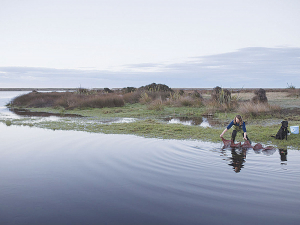Green Light for Fonterra's $3.2b Capital Return Scheme
Fonterra farmer shareholders have approved the mechanism for a $2/share capital return expected from the sale of its global consumer and associated businesses.
 Fonterra hopes the project will help farmers adopt biodiversity objectives into their Farm Environmental Plans and support wider catchment biodiversity goals in the process.
Fonterra hopes the project will help farmers adopt biodiversity objectives into their Farm Environmental Plans and support wider catchment biodiversity goals in the process.
A new project supported by Fonterra's Living Water Partnership with the Department of Conservation will help on-farm advisors grow their understanding of biodiversity, with a view to further building biodiversity objectives into Farm Environment Plans.
'Farming with Native Biodiversity' is a 20-month project coordinated by the NZ Landcare Trust and funded by the National Bioheritage Science Challenge, Living Water, Silver Fern Farms and the Ministry for Primary Industries (MPI).
Protecting and restoring native biodiversity on farms provides clean water, shelter, shade, carbon sequestration, drought resilience and other benefits of a healthy ecosystem.
The Living Water partnership has identified that the biggest barriers to the protection and restoration of biodiversity on farms is limited access to advice and ecological expertise, along with the cost of preparing restoration plans.
"There is widespred interest from farming communities and farm advisors to protect and restore native biodiversity on farms, though expert advice is hard to come by and costly," says Trish Kirkland-Smith, Fonterra's head of environmental partnerships.
Development of a farm biodiversity restoration and management plan can cost between $5,000 - $10,000, with additional costs for monitoring.
Across 25,000 pastoral farms in New Zealand, this is over $125 million for the planning alone.
"This new partnership project trials a more cost-effective way of providing expert advice to the sector, working with over 60 sheep and beef and dairy farms to develop biodiversity plans and implement biodiversity management, then sharing the results with 6,000 more sheep and beef farms and 9,000 dairy farms.
"There is widespread interest from farming communities and farm advisors to protect and restore native biodiversity on farms, though expert advice is hard to come by and costly."
The expected outcome of the project is that farmers adopt biodiversity objectives into their Farm Environment Plans and support wider catchment biodiversity goals in the process.
For Fonterra suppliers, these biodiversity plans will become a part of their existing Farm Environmental Plans, which Fonterra provides to farmer owners free of charge.
Pāmu has welcomed ten new apprentices into its 2026 intake, marking the second year of a scheme designed to equip the next generation of farmers with the skills, knowledge, and experience needed for a thriving career in agriculture.
One team with 43 head, including a contingent from Mid Canterbury, are reflecting on a stellar NZ DairyEvent.
Fonterra farmer shareholders have approved the mechanism for a $2/share capital return expected from the sale of its global consumer and associated businesses.
Trainees in the horticulture industry studying towards a certificate or diploma can now apply for Horticulture New Zealand's (HortNZ) 2026 Industry Training Scholarships programme.
OPINION: The first three Global Dairy Trade (GDT) auctions have been a morale booster for farmers.
Former Fonterra executive Alex Turnbull has been appointed CEO to lead all five Yili Oceania Business Division companies in New Zealand.
OPINION: Staying with politics, with less than nine months to go before the general elections, there’s confusion in the Labour…
OPINION: Winston Peters' tirade against the free trade deal stitched with India may not be all political posturing by the…